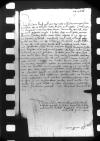Wir mogen E(uer) L(ieb) freuntlicher meÿnung nicht bergen, / das uns der ernvest, achtbar unnd hochgelert unnser cantzler, rath unnd lieber getrewer Johann von Kreytzen (Hans von Kreytzen) (*1516 – †1575), doctor of civil and canon law; displaced by the "new advisors", he settled in Ermland; 1535 envoy of Duke Albrecht von Hohenzollern to the Crown Diet in Cracow; 1536 ducal commissioner for affairs of delimitation between Prussia and Masovia; 1536-1575 Chancellor to Duke Albrecht (SZORC 1990, p. 89, 329, 345; HARTMANN 1525-1550, No. 436, 437, 574; MAŁŁEK 1967, p. 121 footnote 40, 165)⌊Hans von CreÿtzenJohann von Kreytzen (Hans von Kreytzen) (*1516 – †1575), doctor of civil and canon law; displaced by the "new advisors", he settled in Ermland; 1535 envoy of Duke Albrecht von Hohenzollern to the Crown Diet in Cracow; 1536 ducal commissioner for affairs of delimitation between Prussia and Masovia; 1536-1575 Chancellor to Duke Albrecht (SZORC 1990, p. 89, 329, 345; HARTMANN 1525-1550, No. 436, 437, 574; MAŁŁEK 1967, p. 121 footnote 40, 165)⌋ beÿder rechte doctor allerley so E(uer) L(ieb) ihme an uns zutragen / auferlegt / eingebracht unnd nach nodturfft erzelt, / worauff wir dan E(uer) L(ieb) ihn erwegung der hendel umbstendigkeit, / die wir ihr nicht gerne weitleufftigk ausgebreÿt wissen wolten, / nicht schrifftlichen sonder durch vortraute botschafft beantworten wollen, / weren derhalben auch woll geneigt gewesen, / obgedochten unsern cantzler widerumb an E(uer) L(ieb) zufertigen, / so fhallen uns doch itziger zeyth solche hendel fhur. / Darob wir Johann von Kreytzen (Hans von Kreytzen) (*1516 – †1575), doctor of civil and canon law; displaced by the "new advisors", he settled in Ermland; 1535 envoy of Duke Albrecht von Hohenzollern to the Crown Diet in Cracow; 1536 ducal commissioner for affairs of delimitation between Prussia and Masovia; 1536-1575 Chancellor to Duke Albrecht (SZORC 1990, p. 89, 329, 345; HARTMANN 1525-1550, No. 436, 437, 574; MAŁŁEK 1967, p. 121 footnote 40, 165)⌊seÿne personJohann von Kreytzen (Hans von Kreytzen) (*1516 – †1575), doctor of civil and canon law; displaced by the "new advisors", he settled in Ermland; 1535 envoy of Duke Albrecht von Hohenzollern to the Crown Diet in Cracow; 1536 ducal commissioner for affairs of delimitation between Prussia and Masovia; 1536-1575 Chancellor to Duke Albrecht (SZORC 1990, p. 89, 329, 345; HARTMANN 1525-1550, No. 436, 437, 574; MAŁŁEK 1967, p. 121 footnote 40, 165)⌋ zuverschicken abgehalten. /
Weil aber gegenwertiger der ernvest unnser cemerer, rath und lieber getreuer Christoph von Kreytzen (*1512 – †1578), son of Melchior von Kreytzen; at least in 1550-1564 burgrave of Königsberg; at least since 1530 treasurer (Kammerer) and advisor to duke Albrecht von Hohenzollern (outplaced by the "new advisors" nestled in Ermland) (SZORC 1990, p. 89; BORAWSKA 1984, p. 232; ORACKI 1984, p. 155; HARTMANN 1525-1550, No. 491, 534, 1164)⌊Christoff von CreytzenChristoph von Kreytzen (*1512 – †1578), son of Melchior von Kreytzen; at least in 1550-1564 burgrave of Königsberg; at least since 1530 treasurer (Kammerer) and advisor to duke Albrecht von Hohenzollern (outplaced by the "new advisors" nestled in Ermland) (SZORC 1990, p. 89; BORAWSKA 1984, p. 232; ORACKI 1984, p. 155; HARTMANN 1525-1550, No. 491, 534, 1164)⌋ bey uns nicht mynder dan bemelter unnser cantzler in vertrawen gehalten und ist, / haben wir demselben unnser gemuths meÿnung E(uer) L(ieb) von unsertwegen ihnn hohem vertrauen anzutragen / unnd zueroffnen aufferlegt, freuntlich byttendt E(uer) L(ieb) wolle ihme ihnn solchem seynem anbringen als uns selbst volkommen glauben geben, / mit der freuntlichen nachbarlichem unnd gunstiger wilferiger erzeigung, / wie wir uns zu E(uer) L(ieb) ungezweiffelth getrosten unnd vorsehen. / Das seyndth wir umb dieselb in allen freuntlichen nachbarlichem willenn zuvordienen urbutigk.


 BCz, 1606, p. 640
BCz, 1606, p. 640